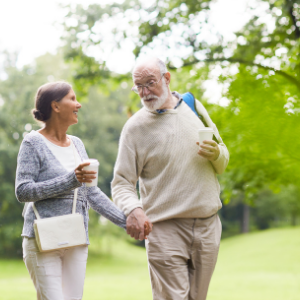
Every year, May is National Walking Month, and this year the focus is on the big mental health benefits that come from small steps. Walking can also help ease the isolation and inactivity caused by lockdown measures needed to slow the spread of coronavirus (Covid-19).
(As always, when we say walking, we include people who use wheelchairs or other mobility aids.)
How will walking make me healthier?
A US report in 2018 concluded that walking is associated with improved mental and neurological health. Just adding 20 minutes of walking to your daily routine can lead to:
- Fewer symptoms of depression
- Reduced feelings of anxiety
- Improved cognitive function
- Improved quality of life
- Improved sleep quality
- Reduced risk of dementia
Just being outside and moving around can boost your mental wellbeing during these strange times we’re living through, whilst also keeping you connected to your local community.
Be sure to wave hello and share a smile with people you see. It might sound simple, but these small acts of kindness can really buoy someone’s spirits.
Walking is also an easy, free way to get fitter – it can encourage mobility and reduce the risks of falls, improve heart health and blood pressure, burn calories and increases metabolism, and improve muscle tone and strength.
To make the most of the health benefits of walking, try to walk at a speed at which your breathing rate and heartbeat increase but you can still carry on a conversation.
Walking routes at CNTW sites
To help our staff and service users stay active, in January we launched signposted walking routes at many of our sites. These are all between 1-1.25 miles, or about 20-30 minutes of walking.
Dr James Hecker, Innovative Speciality Doctor at CNTW, took part in the walk launch at Monkwearmouth Hospital. He said: “Just 10 minutes of brisk walking a day can reduce the risk of diabetes, coronary heart disease and some cancers. And for those that cannot walk at a brisk pace we know that any extra movement matters.
“During the walk there were many travelling at different paces, but we all learned that just a small amount of increased movement beyond what is normal for each individual can have a number of health benefits.
“We positively encourage staff to take regular daily walk breaks.”
St Nicholas Hospital – blue route
St Nicholas Hospital – yellow route
St George’s Park – yellow route
Hopewood Park – blue route
Hopewood Park – yellow route
Walkergate Park
- Walking is a great way to spend quality time with loved ones. And you can all get fitter at the same time. Competition can be a big motivator. See who can stick to the Living Streets #Try20 challenge (20 minutes of walking per day) all month!
- Capturing moments makes walking even more interesting. Take your smart phone or camera along and snap your local park, sunset or town centre. See how many hidden treasures you can find in your local area.
- Try the Living Streets scavenger hunt to spot interesting things in your neighbourhood – download it here: https://www.livingstreets.org.uk/media/1640/scavenger-hunt-pdf.pdf
- Take a romantic stroll with your partner. Instead of slouching in front of the TV, watch the sun set together and create the perfect end to your day.
- Don’t let a hectic week get you down. Walking is the perfect way to zone out and rid yourself of negative thoughts. Take time for yourself and to absorb your surroundings – sights, smells and sounds. Try these tips from Headspace on Walking Meditation.
- Power walking is a great way to stay healthy, boosting fitness and energy levels. You’ll get further in your 20 minutes too! Try walking on different surfaces and inclines – it uses different muscles and will strengthen them as well.
